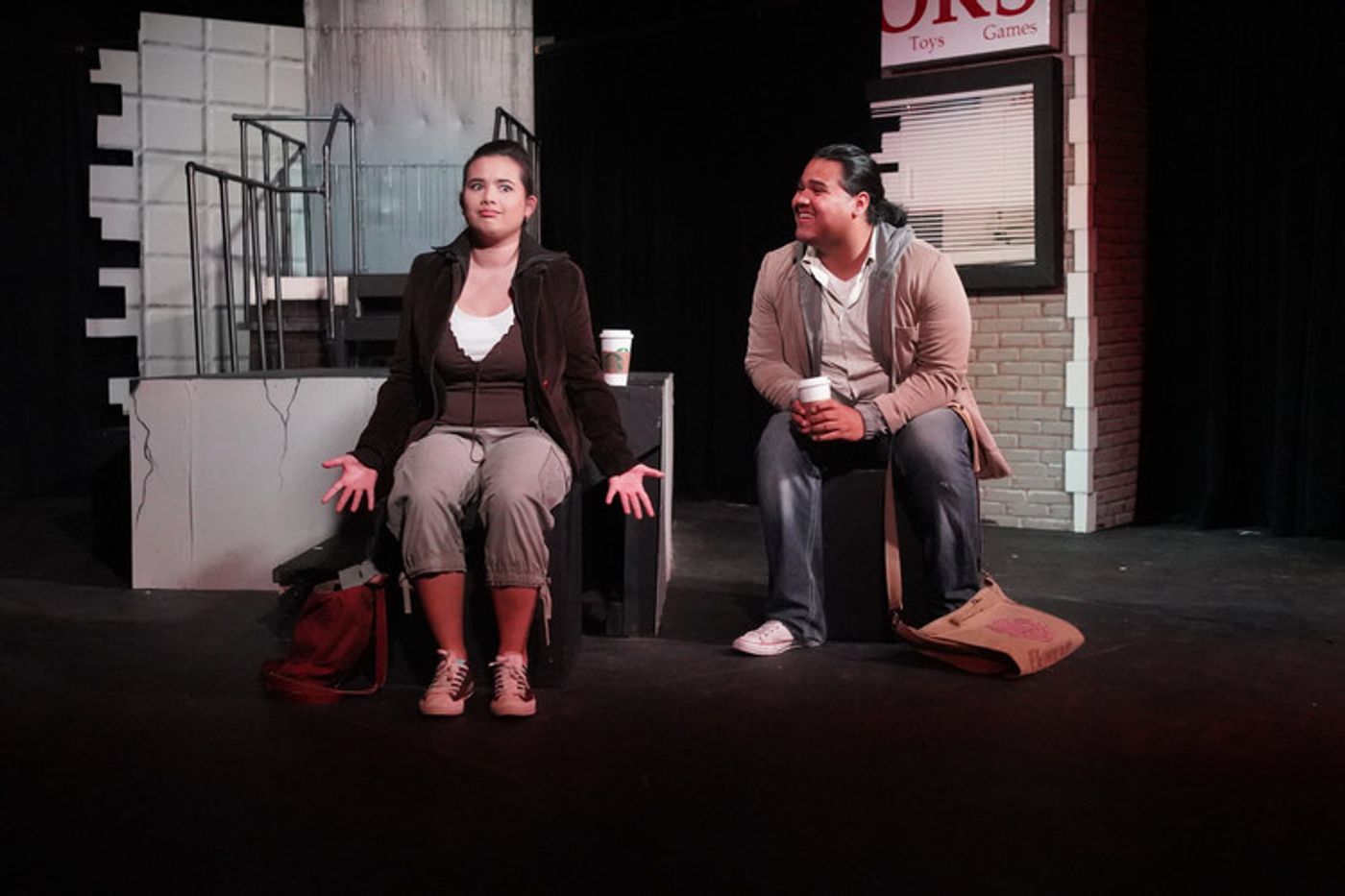Review: ORDINARY DAYS at Lakeside Community Theatre

The title of the show says it all: This is a play about Ordinary Days. The stories of four individuals in New York City loosely intertwine to give us a narrative about finding purpose and making authentic connections amid everyday routine. The couple Claire and Jason struggle through a rough patch in their relationship, while Deb and Warren strike up the most unlikely of friendships in the city that never sleeps.
We find out almost from the get-go that something isn't right in Claire and Jason's relationship. Their struggles were relatable, yet uncomfortable at the same time. We see Claire (Morgan Maxey) pulling back, keeping an emotional distance from Jason. And yet, we see Jason (Gabriel Ethridge) fully devoted to Claire, but not without selfish leanings that make him a flawed individual. Maxey did well in capturing the role of a woman who's afraid of commit to the present as she's clinging too much to her past. Inadvertently, she punishes both herself and Jason in the process. Maxey's voice was high and clear, and her character's internal struggle was tangible throughout. Ethridge's performance was solid but not quite as convincing as Claire's. Though he often professed deep affection for Claire, one had the feeling Ethridge was still holding back in some regard. Additionally, Ethridge's tone quality was inconsistent, and therefore served as a distraction during parts of the show. Nevertheless, the actor excelled when revealing to the audience the complicated hurt that comes with the realization that your relationship is on the ropes.
The more amusing of the two story arcs was that of Deb and Warren. Deb was played by Gabie Hocson, who captured the spirit of a most unlikable and thorny character. Warren (Anthony J Ortega), however, could not have been more happy-go-lucky. Though these two are an unlikely duo, they ultimately connect because of Warren's earnest nature, one that sees beauty in everything- especially the ordinary. He helps Deb to "stop and smell the flowers" and become a more authentic version of herself. Of course, Warren is not so one-dimensional. Ortega flawlessly captured how his character grappled with doubt and trepidation when contemplating his purpose in life. Despite these flickers of sorrow, Ortega still conveyed Warren's perpetually gentle and sunny nature. Ortega's voice was deep and strong, and pleasing to listen to in each and every one of his songs.
Hocson's performance was undoubtedly the standout of the musical. The tone quality of her voice has a "wow" factor- each of her songs has you thinking, this girl has some pipes. The way she belted out numbers packed an extra punch for this already intense character. In addition to her richly beautiful voice, Hocson's acting was fierce. Deb is someone you don't want to get on the wrong side of, a point Hocson drove home again and again. And yet, Deb is not wholly unfeeling- at one point she notices she has hurt Warren, something that causes her to reach out to him in a meaningful way. The friendship the two form changes both, but especially Deb. Hocson conveyed this gradual transition quite well, never letting Deb completely lose her prickly and driven nature.
As far as sets go, the one seen in this show was standard for a black box production. Generally spartan, the perimeter of the set showed awnings and posters that one would typically see on a New York Street. A charming bay window displayed a digital keyboard that was used to accompany the voices onstage. Pianist Emanuel Smith excellently and tirelessly played each song as the sole accompanist. The lighting was also appropriate for a typical black box production and did not vary much throughout the duration of the show. During the last moments of Ordinary Days, a shower of colorful paper filled the set, creating quite a beautiful display. This joy-inducing shower of color during a pivotal moment in the show helped connect the audience to special moments taking place onstage.
Ordinary Days is a unique musical- it doesn't have showstopping ensemble and dance numbers, nor does it have a focal point of conflict with a clear resolution at the end. The stories of this small cast of all four characters hardly even intersect. Instead, this show is an exploration of our daily lives, filled with complex and relatable characters, with a few quirky moments thrown in. Director Emily Leekha brought together a show that started off as four individual story arcs together quite seamlessly. Whether you're familiar with the show already or are looking to experience a new kind of musical, check out Ordinary Days at LCT.
Photo Credit: Humberto De Santiago
Reader Reviews

Videos

